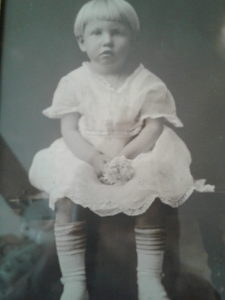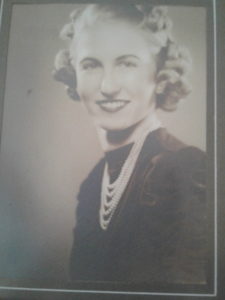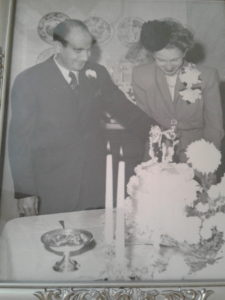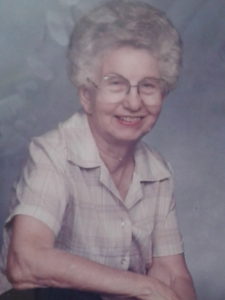
I have jokingly said I had four parents. That statement is more truth than fiction. My sister, Vaudine, was 18 when I was born, and my brother was 13. I learned early they were my allies. I have been told when I was very young, I asked my mother for something. She told me no, I could not have it. I retorted, “That’s O.K. My sister or my brother will get it for me.” My mother gave me a little lesson on my bottom, and I never voiced an opinion like that again.
Vaudine was born in 1916 in Eastland county Texas. By the time she started school, my parents had moved to Necessity in adjoining Stephens county. They later moved to Breckenridge, and she graduated from Breckenridge High School in 1933. Schools had only 11 grades then. She was 16 and attended another year called a post-graduate year.
She attended John Tarleton State College in Stephenville. It was a military college and students wore uniforms. She had a job that paid enough to enable her the luxury of having her uniforms laundered. Her options for a career were teacher, secretary, or nurse. She took classes in Business Administration.

She was active in college affairs. She was in the ETC Club, Press Club, and was feature editor of J-Tac (campus newspaper). I am surprised when I look at her yearbook and see that some friends gave her the nickname “Nutty.” One student wished her luck as the next year’s president of the Press Club. Another wrote, “Well, nose for news Williams, you have to prove it next year.”
When I went through her possessions after her death, I found an acceptance letter for the University of Texas. It saddened me. It was the middle of the depression, and I knew money was not available. My Dad had a small dairy and a WPA job for the county.
After graduation, she went to Fort Worth and worked for Mitchell Cadillac Agency. By the time World War 11 started, she was working for Southwest Greyhound in the accounting department. I thought Fort Worth was the largest city in the world. She lived in a fourplex on 8th Avenue with a friend from Breckenridge, Irene Wesley. They had an upstairs apartment with a balcony. I was intrigued by the balcony. I could look down on 8th Ave and watch the traffic. That was entertaining for a little country girl.
I was with Dad in Fort Worth when he missed a turn and got lost. He spotted a motorcycle policeman sitting at the side of an intersection. He pulled up behind him, got out, and went to ask directions. A large, black car stopped at the intersection. There were two nuns in full habits in the car. I was sure they were gangsters and was frightened. I did not know whether to hunker down on the floor of the car or run to my Dad and the policeman. Fortunately, the light changed, the nuns drove on, and I did not have to decide. My Dad had a good laugh as he explained their dress to me.
Greyhound buses were transporting military personnel. She was given a special assignment to locate where fuel was cheapest. Buses were then routed to those locations to refuel. Her efforts earned her a salary raise. She was the highest-paid female employee in the system. To avoid problems with other female employees, her salary was a secret. My parents knew but were told not to reveal it. No one knew until years later that her sneaky little sister also knew. She said, “A female accountant does her work, half of the male’s work who sits beside her, and makes half the salary.”

A co-worker introduced Vaudine to her brother, Thomas Clifford (Jack) Jones. They were married in 1945. Roommate Irene had married and taken the apartment across the hall. She and Jack lived in the apartment on 8th Ave until they built a house in Haltom City. They lived in the house until they both died. Jack had a salvage yard on NE 28th Street.
She had been with Greyhound twenty years when the company moved its headquarters to Kansas City. She chose not to move. She was asked to help train the new employees. She had an apartment in Kansas City and all expenses paid. She did that for a year. Jack’s health was failing, and he was there with her most of the time.
At that time, she was almost unemployable as she was female and past forty years of age. She did part-time work for several companies. The longest stint was bookkeeping for Leonard Farms. Eventually she was hired at Arlington State College (now University of Texas Arlington). She enjoyed her work there. She had responsibilities, but she said she did not have the constant pressure she had at Greyhound. She was bonded and accompanied by a security guard as she collected money taken in at various points on the campus. She described it as being a floating bank. She had an office in Hereford Hall, the university center. One
duty she particularly enjoyed was arranging accommodations for celebrities who performed on campus. I remember she had a problem finding ungassed bananas requested by a popular female singer for her dressing room. She saw many changes and growth on the campus.
After she had been there for twenty years, we received an invitation to a retirement reception. She was surprised that they sent invitations and kept saying, “I have no idea what is planned. Most of them are cookies and punch affairs.” She was pleasantly surprised and overwhelmed when we entered the event area. She remarked that it looked like a banquet, and then wondered if enough people would attend to eat all the food. She had friends among administrators, faculty, staff, and students. It was an elegant affair and well attended. She deserved it.
She kept busy in retirement. She was active with church work and various projects she had not had time for earlier.
Jack’s health began to fail. He died in 1989.
Jack’s sister lost her husband shortly after Jack died. She wanted Vaudine to go to a grief support group with her. She kept insisting until Vaudine finally went. Vaudine said, “If you are not depressed when you go in there, you will be when you come out. Those women can’t even write checks.” She did not go back.
She and Jack always sat in certain chairs at the dining table. Looking at Jack’s empty chair saddened her. She said, “I fixed that. I moved over to his chair.”
Jack had leased the salvage yard. There was a large building on a lot behind their house. To say that Jack did not dispose of anything was an understatement. Our son, Charles, took on the monumental task of sorting things of value from worthless things. He was moving a pallet of concrete sacks. In the middle was a large container. When he opened it, he discovered it was filled with rolled silver coins. He and Vaudine put them in a safety deposit box at a bank. She had Charles’ name on the box with hers. When Vaudine died, it was decided to get the coins out of the box. The boys, Ken, Charles, Kevin, and nephew Roger went to the bank with bags to retrieve them. Charles did the paperwork and they filled their containers. They walked nonchalantly through the lobby each carrying a bag of coins. They put them in the trunk of the car. Ken was carrying an old canvas overnighter of Jack’s. As he lifted it into the trunk, the bottom fell out of it and coins rolled everywhere. They laughed at the thought of the scene they would have made if this had happened in the bank lobby.
As Vaudine’s health began to deteriorate, our niece Margaret who lived in the area, began to look after her. She helped with errands, doctor appointments, and other things. We were living in the Rio Grande Valley, 500 miles from Fort Worth.
Vaudine was a stickler about annual health checkups. She began to have complaints. Tests were done but came back negative. She fell while walking in the neighborhood and was hospitalized. A nursing agency provided nurses 24 hours a day. Instead of getting better, she got worse and was again hospitalized. She had a mass on a shoulder that began to hurt. It was decided to biopsy it. It came back cancer. More tests found it in all major organs and her bones. It was beyond treatment. Margaret and I and her pastor were in the room when the doctor told her. She stoically accepted the diagnosis. Margaret thinks she was expecting it to be serious. She looked at her pastor, held out her hand to him, and said, “I want you to ask the church and the ladies in my group to all pray that this will be quick and not long and drawn out.”
Her doctor was adamant that I could not care for her at home. He gave Margaret and I a list of facilities. (There were only nursing homes at that time.) We visited them and came out with tears as we left. I told the doctor that I would not do that to her. He told us there was one upscale place on the west side. He arranged for us to visit it and chuckled as he said the patients were mostly old doctors and lawyers. She was moved there. The room was spacious, and the staff was competent and caring. They also made sure that I wanted for nothing. I spent the days there and went to her house at night. Her protectiveness stayed with her until the end. She did not want me to come mornings until the eight o’clock traffic had cleared. I was to leave early evening. She said she did not want to lay there and worry about me driving and going into an empty house after dark.
Her prayers were answered. She lived only a few weeks. She died a peaceful death on April 15, 1993. She and Jack are buried at Mount Olivet Cemetery in Fort Worth.

Comments
2 responses to “THE OTHER MOTHER”
Dear Charlcy Ann , I am so sorry I never knew her. She came alive for me in the telling.
I hope you are feeling better. I will call if I find myself in your vicinity this fall.
Hopefully we can spend the day together.
How I love these types of family history!! Yours is most interesting since I know of mosT of your RGV family & beyond now!! I also had family who lived in Breckinridge when I was young, my mom’s sister & her family lived there for quite a few years. (Last name Darden).
My view of the faces of the “boys” when that bag of coins broke open!!
I await your next adventure! Love, prayers, & good thoughts to all!!